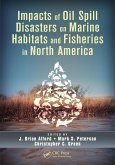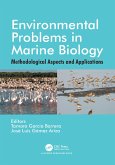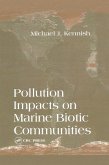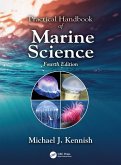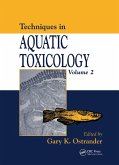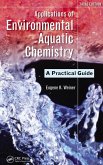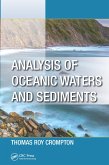Impacts of Oil Spill Disasters on Marine Habitats and Fisheries in North America (eBook, ePUB)
Redaktion: Alford, J. Brian; Green, Christopher C.; Peterson, Mark S.
46,95 €
46,95 €
inkl. MwSt.
Sofort per Download lieferbar

23 °P sammeln
46,95 €
Als Download kaufen

46,95 €
inkl. MwSt.
Sofort per Download lieferbar

23 °P sammeln
Jetzt verschenken
Alle Infos zum eBook verschenken
46,95 €
inkl. MwSt.
Sofort per Download lieferbar
Alle Infos zum eBook verschenken

23 °P sammeln
Impacts of Oil Spill Disasters on Marine Habitats and Fisheries in North America (eBook, ePUB)
Redaktion: Alford, J. Brian; Green, Christopher C.; Peterson, Mark S.
- Format: ePub
- Merkliste
- Auf die Merkliste
- Bewerten Bewerten
- Teilen
- Produkt teilen
- Produkterinnerung
- Produkterinnerung

Bitte loggen Sie sich zunächst in Ihr Kundenkonto ein oder registrieren Sie sich bei
bücher.de, um das eBook-Abo tolino select nutzen zu können.
Hier können Sie sich einloggen
Hier können Sie sich einloggen
Sie sind bereits eingeloggt. Klicken Sie auf 2. tolino select Abo, um fortzufahren.

Bitte loggen Sie sich zunächst in Ihr Kundenkonto ein oder registrieren Sie sich bei bücher.de, um das eBook-Abo tolino select nutzen zu können.
At an increasingly global scale, aquatic scientists are heavily entrenched in understanding the fate of marine ecosystems in the face of human-altered environments. Oil spill disasters, especially large-scale ones like the 2010 Deepwater Horizon tragedy, have left uncertain and indelible marks on marine ecosystems. Impacts of Oil Spill Disasters on
- Geräte: eReader
- mit Kopierschutz
- eBook Hilfe
- Größe: 8.21MB
Andere Kunden interessierten sich auch für
![Impacts of Oil Spill Disasters on Marine Habitats and Fisheries in North America (eBook, PDF) Impacts of Oil Spill Disasters on Marine Habitats and Fisheries in North America (eBook, PDF)]() Impacts of Oil Spill Disasters on Marine Habitats and Fisheries in North America (eBook, PDF)46,95 €
Impacts of Oil Spill Disasters on Marine Habitats and Fisheries in North America (eBook, PDF)46,95 €![Environmental Problems in Marine Biology (eBook, ePUB) Environmental Problems in Marine Biology (eBook, ePUB)]() Environmental Problems in Marine Biology (eBook, ePUB)46,95 €
Environmental Problems in Marine Biology (eBook, ePUB)46,95 €![Pollution Impacts on Marine Biotic Communities (eBook, ePUB) Pollution Impacts on Marine Biotic Communities (eBook, ePUB)]() Michael J. KennishPollution Impacts on Marine Biotic Communities (eBook, ePUB)60,95 €
Michael J. KennishPollution Impacts on Marine Biotic Communities (eBook, ePUB)60,95 €![Practical Handbook of Marine Science (eBook, ePUB) Practical Handbook of Marine Science (eBook, ePUB)]() Michael J. KennishPractical Handbook of Marine Science (eBook, ePUB)46,95 €
Michael J. KennishPractical Handbook of Marine Science (eBook, ePUB)46,95 €![Techniques in Aquatic Toxicology, Volume 2 (eBook, ePUB) Techniques in Aquatic Toxicology, Volume 2 (eBook, ePUB)]() Techniques in Aquatic Toxicology, Volume 2 (eBook, ePUB)253,95 €
Techniques in Aquatic Toxicology, Volume 2 (eBook, ePUB)253,95 €![Applications of Environmental Aquatic Chemistry (eBook, ePUB) Applications of Environmental Aquatic Chemistry (eBook, ePUB)]() Eugene R. WeinerApplications of Environmental Aquatic Chemistry (eBook, ePUB)46,95 €
Eugene R. WeinerApplications of Environmental Aquatic Chemistry (eBook, ePUB)46,95 €![Analysis of Oceanic Waters and Sediments (eBook, ePUB) Analysis of Oceanic Waters and Sediments (eBook, ePUB)]() Thomas Roy CromptonAnalysis of Oceanic Waters and Sediments (eBook, ePUB)46,95 €
Thomas Roy CromptonAnalysis of Oceanic Waters and Sediments (eBook, ePUB)46,95 €-
-
-
At an increasingly global scale, aquatic scientists are heavily entrenched in understanding the fate of marine ecosystems in the face of human-altered environments. Oil spill disasters, especially large-scale ones like the 2010 Deepwater Horizon tragedy, have left uncertain and indelible marks on marine ecosystems. Impacts of Oil Spill Disasters on
Dieser Download kann aus rechtlichen Gründen nur mit Rechnungsadresse in A, B, BG, CY, CZ, D, DK, EW, E, FIN, F, GR, HR, H, IRL, I, LT, L, LR, M, NL, PL, P, R, S, SLO, SK ausgeliefert werden.
Produktdetails
- Produktdetails
- Verlag: Taylor & Francis eBooks
- Seitenzahl: 340
- Erscheinungstermin: 29. Oktober 2014
- Englisch
- ISBN-13: 9781040162323
- Artikelnr.: 73302969
- Verlag: Taylor & Francis eBooks
- Seitenzahl: 340
- Erscheinungstermin: 29. Oktober 2014
- Englisch
- ISBN-13: 9781040162323
- Artikelnr.: 73302969
- Herstellerkennzeichnung Die Herstellerinformationen sind derzeit nicht verfügbar.
J. Brian Alford is currently an assistant professor at The University of Tennessee, Knoxville, USA. He holds a BS and MS from the University of Southern Mississippi, Hattiesburg, USA, and a Ph.D from Mississippi State University, Starkville, USA. He previously worked as an environmental scientist for the Mississippi Department of Environmental Quality, Jackson, USA; field technician at North Carolina State University, Raleigh, USA; research coordinator at Mississippi State University for assessing post-Hurricane Katrina restoration of catfish and largemouth bass fisheries in the Pascagoula River Basin; and fisheries research biologist for the Louisiana Department of Wildlife and Fisheries, Baton Rouge, USA. Mark S. Peterson is a professor at The University of Southern Mississippi, Ocean Springs, USA. His current research projects in the university's Gulf Coast Research Laboratory include: developing ecosystem-based management tools (field monitoring, GIS, modeling) to evaluate habitat use and recruitment success of fishes in coastal ecosystems; evaluating the influence of altered/fragmented, partially-altered/fragmented, and near-pristine salt-marsh tidal creeks on diversity, community structure, and food web structure of fishes using traditional and stable isotope methodology; quantifying size-related movement patterns and critical habitat characteristics of threatened Gulf sturgeon including large-scale connectivity of eastern and western populations; and more. Christopher C. Green is an associate professor at Louisiana State University (LSU), Baton Rouge, USA. He holds a BS from the University of Oklahoma, Norman, USA; MS from the University of Arkansas at Pine Bluff, USA; and Ph.D from Southern Illinois University, Carbondale, USA. Dr. Green's lab at the LSU Agricultural Center (AgCenter) focuses on applied reproductive fish physiology and endocrinology, with an emphasis on freshwater and estuarine aquaculture species. A popular reviewer, Dr. Green has served on the editorial board of the North American Journal of Aquaculture and as co-editor of the second edition of Cryopreservation of Aquatic Species.
Multiple Effects of Oil and Its Components in Fish. Toxicological and
Physiological Effects of the Surfactant Dioctyl Sodium Sulfosuccinate at
Varying Salinities During Larval Development of the Gulf Killifish (
Fundulus grandis). Endocrine Disruption as a Mechanism of Action Underlying
Sublethal Effects in Pacific Herring (Clupea harengus pallasi) Exposed to
the Dissolved Hydrocarbon Fraction of Crude Oil. Proper Handling of Animal
Tissues from the Field to the Laboratory Supports Reliable Biomarker
Endpoints. Early Review of Potential Impacts of the Deepwater Horizon Oil
Spill on Gulf of Mexico Wetlands and Their Associated Fisheries. A Brief
Review of the Effects of Oil and Dispersed Oil on Coastal Wetlands
Including Suggestions for Future Research. Oil Contamination in Mississippi
Salt Marsh Habitats and the Impacts to Spartina alterniflora
Photosynthesis. City, County, and State Methods to Protect Nearshore
Fisheries Habitat in Mississippi During the Deepwater Horizon Oil Spill.
Lessons from the 1989 Exxon Valdez Oil Spill: A Biological Perspective. The
Exxon Valdez Oil Spill and the Collapse of the Prince William Sound Herring
Stock: A Reexamination of Critical Biomass Estimates. Effects of the Ixtoc
I Oil Spill on Fish Assemblages in the Southern Gulf of Mexico. Impacts of
the Deepwater Horizon Oil Spill on the Reproductive Biology of Spotted
Seatrout (Cynoscion nebulosus). Impacts of the Deepwater Horizon Oil Spill
on Blue Crab, Callinectes sapidus, Larval Settlement in Mississippi. Oyster
Responses to the Deepwater Horizon Oil Spill across Coastal Louisiana:
Examining Oyster Health and Hydrocarbon Bioaccumulation. Occurrence of
Lemon Sharks (Negaprion brevirostris) at the Chandeleur Islands, Louisiana,
before and after the 2010 Deepwater Horizon Disaster.
Physiological Effects of the Surfactant Dioctyl Sodium Sulfosuccinate at
Varying Salinities During Larval Development of the Gulf Killifish (
Fundulus grandis). Endocrine Disruption as a Mechanism of Action Underlying
Sublethal Effects in Pacific Herring (Clupea harengus pallasi) Exposed to
the Dissolved Hydrocarbon Fraction of Crude Oil. Proper Handling of Animal
Tissues from the Field to the Laboratory Supports Reliable Biomarker
Endpoints. Early Review of Potential Impacts of the Deepwater Horizon Oil
Spill on Gulf of Mexico Wetlands and Their Associated Fisheries. A Brief
Review of the Effects of Oil and Dispersed Oil on Coastal Wetlands
Including Suggestions for Future Research. Oil Contamination in Mississippi
Salt Marsh Habitats and the Impacts to Spartina alterniflora
Photosynthesis. City, County, and State Methods to Protect Nearshore
Fisheries Habitat in Mississippi During the Deepwater Horizon Oil Spill.
Lessons from the 1989 Exxon Valdez Oil Spill: A Biological Perspective. The
Exxon Valdez Oil Spill and the Collapse of the Prince William Sound Herring
Stock: A Reexamination of Critical Biomass Estimates. Effects of the Ixtoc
I Oil Spill on Fish Assemblages in the Southern Gulf of Mexico. Impacts of
the Deepwater Horizon Oil Spill on the Reproductive Biology of Spotted
Seatrout (Cynoscion nebulosus). Impacts of the Deepwater Horizon Oil Spill
on Blue Crab, Callinectes sapidus, Larval Settlement in Mississippi. Oyster
Responses to the Deepwater Horizon Oil Spill across Coastal Louisiana:
Examining Oyster Health and Hydrocarbon Bioaccumulation. Occurrence of
Lemon Sharks (Negaprion brevirostris) at the Chandeleur Islands, Louisiana,
before and after the 2010 Deepwater Horizon Disaster.
Multiple Effects of Oil and Its Components in Fish. Toxicological and
Physiological Effects of the Surfactant Dioctyl Sodium Sulfosuccinate at
Varying Salinities During Larval Development of the Gulf Killifish (
Fundulus grandis). Endocrine Disruption as a Mechanism of Action Underlying
Sublethal Effects in Pacific Herring (Clupea harengus pallasi) Exposed to
the Dissolved Hydrocarbon Fraction of Crude Oil. Proper Handling of Animal
Tissues from the Field to the Laboratory Supports Reliable Biomarker
Endpoints. Early Review of Potential Impacts of the Deepwater Horizon Oil
Spill on Gulf of Mexico Wetlands and Their Associated Fisheries. A Brief
Review of the Effects of Oil and Dispersed Oil on Coastal Wetlands
Including Suggestions for Future Research. Oil Contamination in Mississippi
Salt Marsh Habitats and the Impacts to Spartina alterniflora
Photosynthesis. City, County, and State Methods to Protect Nearshore
Fisheries Habitat in Mississippi During the Deepwater Horizon Oil Spill.
Lessons from the 1989 Exxon Valdez Oil Spill: A Biological Perspective. The
Exxon Valdez Oil Spill and the Collapse of the Prince William Sound Herring
Stock: A Reexamination of Critical Biomass Estimates. Effects of the Ixtoc
I Oil Spill on Fish Assemblages in the Southern Gulf of Mexico. Impacts of
the Deepwater Horizon Oil Spill on the Reproductive Biology of Spotted
Seatrout (Cynoscion nebulosus). Impacts of the Deepwater Horizon Oil Spill
on Blue Crab, Callinectes sapidus, Larval Settlement in Mississippi. Oyster
Responses to the Deepwater Horizon Oil Spill across Coastal Louisiana:
Examining Oyster Health and Hydrocarbon Bioaccumulation. Occurrence of
Lemon Sharks (Negaprion brevirostris) at the Chandeleur Islands, Louisiana,
before and after the 2010 Deepwater Horizon Disaster.
Physiological Effects of the Surfactant Dioctyl Sodium Sulfosuccinate at
Varying Salinities During Larval Development of the Gulf Killifish (
Fundulus grandis). Endocrine Disruption as a Mechanism of Action Underlying
Sublethal Effects in Pacific Herring (Clupea harengus pallasi) Exposed to
the Dissolved Hydrocarbon Fraction of Crude Oil. Proper Handling of Animal
Tissues from the Field to the Laboratory Supports Reliable Biomarker
Endpoints. Early Review of Potential Impacts of the Deepwater Horizon Oil
Spill on Gulf of Mexico Wetlands and Their Associated Fisheries. A Brief
Review of the Effects of Oil and Dispersed Oil on Coastal Wetlands
Including Suggestions for Future Research. Oil Contamination in Mississippi
Salt Marsh Habitats and the Impacts to Spartina alterniflora
Photosynthesis. City, County, and State Methods to Protect Nearshore
Fisheries Habitat in Mississippi During the Deepwater Horizon Oil Spill.
Lessons from the 1989 Exxon Valdez Oil Spill: A Biological Perspective. The
Exxon Valdez Oil Spill and the Collapse of the Prince William Sound Herring
Stock: A Reexamination of Critical Biomass Estimates. Effects of the Ixtoc
I Oil Spill on Fish Assemblages in the Southern Gulf of Mexico. Impacts of
the Deepwater Horizon Oil Spill on the Reproductive Biology of Spotted
Seatrout (Cynoscion nebulosus). Impacts of the Deepwater Horizon Oil Spill
on Blue Crab, Callinectes sapidus, Larval Settlement in Mississippi. Oyster
Responses to the Deepwater Horizon Oil Spill across Coastal Louisiana:
Examining Oyster Health and Hydrocarbon Bioaccumulation. Occurrence of
Lemon Sharks (Negaprion brevirostris) at the Chandeleur Islands, Louisiana,
before and after the 2010 Deepwater Horizon Disaster.

